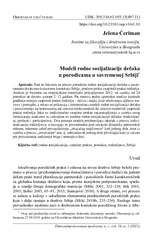Приказ основних података о документу
Modeli rodne socijalizacije dečaka u porodicama u savremenoj Srbiji
Models of Boys’ Gender Socialization in Families in Modern-day Serbia
| dc.creator | Ćeriman, Jelena | |
| dc.date.accessioned | 2021-10-26T18:00:07Z | |
| dc.date.available | 2021-10-26T18:00:07Z | |
| dc.date.issued | 2021 | |
| dc.identifier.issn | 0353-1589 | |
| dc.identifier.uri | http://rifdt.instifdt.bg.ac.rs/123456789/2331 | |
| dc.description.abstract | This paper focuses on the process of gender socialization of boys, examined through parenting practices of mothers and fathers in the contemporary socio-cultural context of Serbia. The analysis is based on empirical material collected via semi-structured interviews during 2012 on a sample of 24 families with children aged 2 to 12. The constant comparative analysis (grounded theory method) includes attitudes and actions of parents of boys and girls (as a control group) in the process of family gender socialization, and enables interpretation of boys’ gender socialization models on a continuum ranging from traditional to modern upbringing practices of parents. The research shows that parental practices in modern-day Serbia are still primarily traditional. Of the three distinct models of boys’ gender socialization (traditional, transitional and participatory), the last two represent a step forward in the direction of the individualization of parenthood and more egalitarian gender socialization patterns influenced primarily by partner relationship dynamics. These dynamics are initiated by mothers’ reflexiveness and the transformation of the concept of the “sacrificing motherhood”. The dynamic of partner relationships thus shifts in the direction of “sacrificing fatherhood”, that is, a father’s renunciation of a part of the privileges he enjoyed before entering the responsibilities within the household. Interactions with the social environment (and perceived changes in it), as well as interactions with the family of origin are crucial elements in whose interrelation the upbringing practices of parents are built and within which gender socialization of boys takes place in the socio-cultural context of contemporary families in Serbia. | sr |
| dc.description.abstract | This paper focuses on the process of gender socialization of boys, examined through parenting practices of mothers and fathers in the contemporary socio-cultural context of Serbia. The analysis is based on empirical material collected via semi-structured interviews during 2012 on a sample of 24 families with children aged 2 to 12. The constant comparative analysis (grounded theory method) includes attitudes and actions of parents of boys and girls (as a control group) in the process of family gender socialization, and enables interpretation of boys’ gender socialization models on a continuum ranging from traditional to modern upbringing practices of parents. The research shows that parental practices in modern-day Serbia are still primarily traditional. Of the three distinct models of boys’ gender socialization (traditional, transitional and participatory), the last two represent a step forward in the direction of the individualization of parenthood and more egalitarian gender socialization patterns influenced primarily by partner relationship dynamics. These dynamics are initiated by mothers’ reflexiveness and the transformation of the concept of the “sacrificing motherhood”. The dynamic of partner relationships thus shifts in the direction of “sacrificing fatherhood”, that is, a father’s renunciation of a part of the privileges he enjoyed before entering the responsibilities within the household. Interactions with the social environment (and perceived changes in it), as well as interactions with the family of origin are crucial elements in whose interrelation the upbringing practices of parents are built and within which gender socialization of boys takes place in the socio-cultural context of contemporary families in Serbia. | sr |
| dc.language.iso | sr | sr |
| dc.publisher | Beograd: Odeljenje za etnologiju i antropologiju Filozofskog fakulteta u Beogradu | sr |
| dc.relation | "Gender Perspectives in Family Socialization", u okviru RRPP Regionalnog programa podrške istraživanjima u oblasti društvenih nauka na Zapadnom Balkanu | sr |
| dc.relation | info:eu-repo/grantAgreement/MESTD/inst-2020/200025/RS// | sr |
| dc.rights | openAccess | sr |
| dc.rights.uri | https://creativecommons.org/licenses/by/4.0/ | |
| dc.source | Etnoantropološki problemi | sr |
| dc.subject | gender socialization | sr |
| dc.subject | upbringing practices | sr |
| dc.subject | family | sr |
| dc.subject | parenting | sr |
| dc.subject | Serbia | sr |
| dc.subject | GenLab | sr |
| dc.title | Modeli rodne socijalizacije dečaka u porodicama u savremenoj Srbiji | sr |
| dc.title | Models of Boys’ Gender Socialization in Families in Modern-day Serbia | sr |
| dc.type | article | sr |
| dc.rights.license | BY-NC-ND | sr |
| dcterms.abstract | Ћериман, Јелена; Модели родне социјализације дечака у породицама у савременој Србији; Модели родне социјализације дечака у породицама у савременој Србији; | |
| dc.citation.issue | 1 | |
| dc.citation.volume | 16 | |
| dc.citation.spage | 245 | |
| dc.citation.epage | 270 | |
| dc.identifier.doi | 10.21301/eap.v16i1.10 | |
| dc.type.version | publishedVersion | sr |
| dc.identifier.fulltext | http://rifdt.instifdt.bg.ac.rs/bitstream/id/8285/Modeli_rodne_socijalizacije_decaka_u_por.pdf |

